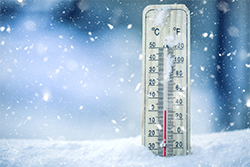Tips for keeping you and your family healthy this winter

Snowstorms. Freezing temperatures. Flu outbreaks. The telltale signs of winter can prove daunting to even the heartiest of people. Shorter days and colder weather can make it difficult for you and your family to find the motivation to be as active and healthy as during other times of the year. But motivation is key.
“Spending large amounts of time indoors, combined with low energy levels can set the foundation for a weakened immune system,” explains Dr. Donald Enoch, a Family Medicine practitioner with NewYork-Presbyterian Medical Group Hudson Valley. “Viruses can thrive indoors. If your immune system is compromised, you're likely to catch the latest bug and the misery that goes along with it.”
The key to prevention is recognizing the safety risks and patterns of illness in advance — while there’s time to do something about it, and to make you better equipped to cope if illness does strike. These simple prevention and lifestyle tips can go a long way toward keeping you and your family healthy all winter long:
- Get a flu shot: The best way to prevent the flu is by getting vaccinated each year, and it’s still not too late to get one. Says Dr. Enoch, “Most everyone over the age of six months should receive the flu shot, particularly those people who are at high risk for developing complications from it. These include seniors, young children, and those with certain medical conditions, such as asthma and heart disease.” People infected with the flu virus can spread it to others up to six feet away — through coughing, sneezing, or talking. It can also be transmitted by unknowingly touching a surface or object that has the flu virus on it and then touching your mouth or nose. A flu shot can reduce the risk of illness by 50 to 60 percent, and can decrease the severity and side effects if you do get sick.
- Enjoy time outdoors: Breathing in fresh air, regardless of the season, is good for the body. Fitness experts and researchers have found that outdoor activity in cold weather offers many benefits, such as increasing energy while decreasing tension, frustration and depression. Plus, increased exposure to sunlight may help fend off seasonal affective disorder (SAD), a type of depression linked to seasonal changes.
- Exercise: Regular exercise helps strengthen the immune system, which helps reduce risk of illness. Exercise can also help reduce the risk of cold and flu. Even a 10-minute workout can make a huge difference in how you feel.
- Practice hand hygiene: Frequent hand washing throughout the day plays an essential role in maintaining good health, especially during the winter. It not only helps protect the immune system and prevent against developing flu and cold, but it also protects others around you. In addition, research studies show that those who carry and use hand sanitizers had 59 percent fewer cases of stomach bugs than non-users. When used correctly, these products nearly eliminate germs.
- Eat smart: Always have a healthy breakfast, which provides the all-important fuel boost for your body at the start of the day. Follow it up with a small lunch and dinner and healthy snacks in between. Focus on healthy fruits and vegetables, lean meats, and whole grains. Limit your intake of fatty foods.
- Socialize more: Friendships counteract the harmful effects of stress hormones, which can lead to illness. Winter is a good time to reconnect with old friends, plan dinners, movie nights and game nights to stay involved and engaged with others.
- Get enough sleep: This is probably the most important thing to do this season, because any other precautions you take against cold or flu — the right food, supplements, even vaccinations — won't offer the same protection if your body is too fatigued to use them properly.
- Visit your doctor: If you feel aches and fatigue coming on that could signal the flu, ask your doctor about antiviral medications, which are effective only if taken within 48 hours of exposure. Says Dr. Enoch, “It's important to distinguish the flu from the common cold, to avoid experiencing possible side effects from unnecessary medications.”
To find a family medicine physician at NewYork-Presbyterian Hudson Valley Hospital, visit hudsonvalleydoctors.nyp.org or call 888-697-4010.


